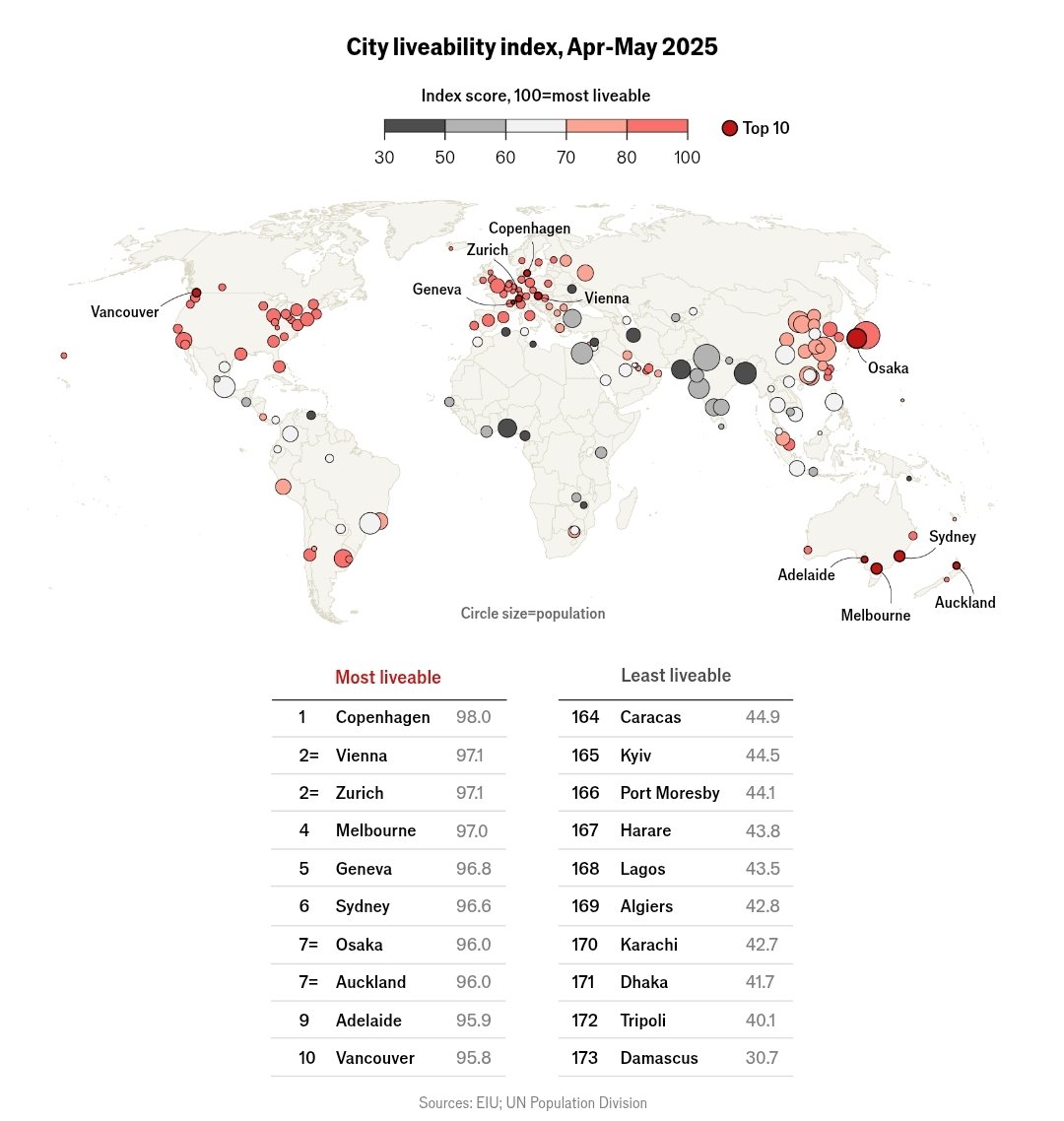
Posted on 11/22/2025 8:58:17 PM PST by SeekAndFind
FOR THE second year running living conditions have not improved in cities around the world, according to the latest liveability index from EIU, our sister company. The annual survey, designed to help companies calculate hardship allowances when they relocate staff, rates 173 cities across five categories: health care, culture and environment, education, infrastructure and stability. While scores in the first four categories have mostly remained constant or improved, gains have been offset by declines in stability.


Vienna is a case in point. The Austrian capital was the world’s most liveable city from 2022 to 2024. But this year it lost its place because two foiled terrorist attacks—on a Taylor Swift concert and on a train station—brought down its stability score, which quantifies the threat of military conflict, civil unrest and terrorism. Vienna now shares second place with Zurich. Copenhagen, one of only six cities to achieve a perfect score in the stability category, tops the overall ranking this year. Melbourne and Geneva round out the top five.
Smaller places generally do well on the index. Only three cities in the top 20 have more than 6m residents. London and New York are in 54th and 69th place respectively. Crime levels and the threat of terrorism are high in those cities. Their roads are also congested. Tokyo, the world’s largest city, ranks 13th.

Instability hurts liveability at the other end of the table, too. Damascus remains at the bottom of the ranking (but the toppling of Bashar al-Assad in December and America’s subsequent decision to lift economic sanctions on Syria bode well for the capital in the next edition of the ranking). Kyiv is in the bottom ten for the third year in a row. Tehran, just outside the bottom ten, is now being bombed by Israel and so is unlikely to rise. Military confrontation on the Kashmir border was one factor that reduced stability scores for the five Indian cities in the index. (Karachi, the only Pakistani entry, already scored badly in this category.)
Calgary, in western Canada, recorded the biggest tumble in this year’s ranking, dropping from fifth place to 18th. Two of the three other Canadian cities in the index also fell. This reflects long waiting lists for health care in Canada and a shortage of housing. Mark Carney, Canada’s prime minister since March, has his work cut out. Conversely, Saudi Arabia’s Vision 2030, a programme intended to reduce the economy’s reliance on oil, helped Al Khobar, a resort town famed for its shops and malls, record the biggest improvement over the past year. The city jumped 13 places to 135th.
Among the 30 rated cities in western Europe and 25 in North America, only one—Athens—fails to achieve the highest tier of liveability, defined as a score of 80 or above. Asia is the third-best region for liveability, although its cities have a much wider range of living conditions. Almost half of the top 20 places are located in East Asia and Australasia. Many South Asian cities rank far lower, partly due to high pollution and temperatures.
The outlook is mixed. Inflation, which has hurt living standards over the past few years, seems to be falling. But geopolitical tensions are increasing, threatening stability and quality of life everywhere. ■
They’re all tied for last.
Same here.
I’ve been spent significant time in several of these cities. I am pretty sure these “researchers” have not. Vancouver and Vienna can hardly be on the same page as Zurich. Unless there has been some recent deep cleaning of streets and graffiti and deportations from Copenhagen, it is also rated too highly.
Of course you get strange calculations like 7.34 x the number of hamsters per capita - 4.23 x average run time of washing machines in hours per week in you scoring, but no one reads that part of the report.
High taxes, high socialism, is always considered a positive in these leftist created lists. Japan will tax you up to 50% of your world-wide stock gains and income. Most Japanese have no interest in speaking English, and you better love living around millions of very old Japanese that don't love you.
Life is short, so go where you are wanted. You can tell where you belong by how the locals treat you. But the number one rule is: avoid proximity to psychopaths.
And none are in Germany itself. How come?
Vienna used to be a really beautiful city....but it was also expensive as hell. The same goes for a lot of their other most highly rated cities. To me, cost of living is a huge factor in livability.
Oh....and nowadays Vienna is still expensive, but now its been infested with lots of muslims.
I should add....My criteria would include how good their roads are and how much parking space is available, how easy it is to shop and get the things I want anytime I want, etc. Note, pretty much every city they rank highly I would rank low and vice versa because I LIKE open space. I LIKE the convenience of being able to drive and not having to rely on public transport.
How could Port-Au-Prince (Haiti) and Mogadishu (Somalia) NOT make the LEAST list?
Vancouver?
Disclaimer: Opinions posted on Free Republic are those of the individual posters and do not necessarily represent the opinion of Free Republic or its management. All materials posted herein are protected by copyright law and the exemption for fair use of copyrighted works.